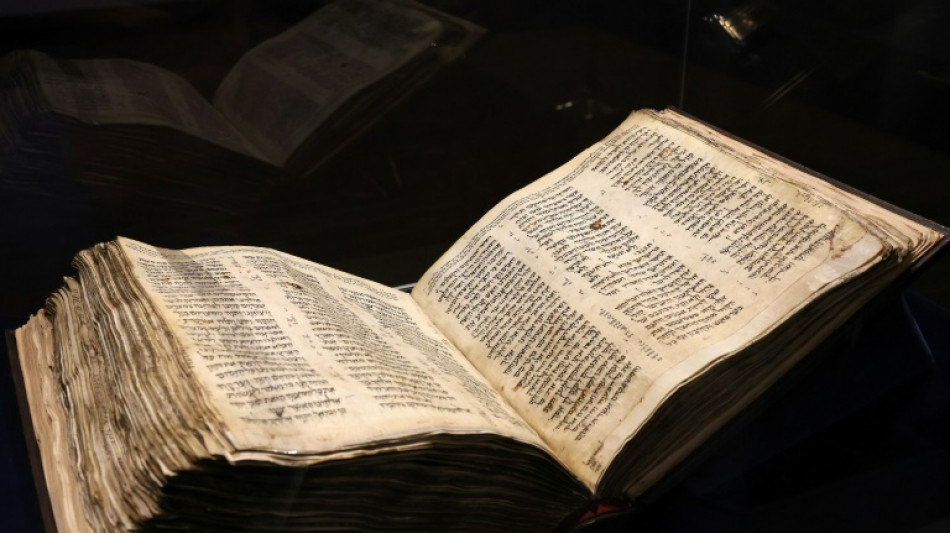
-
 Veteran Wallaby Beale set for long-awaited injury return
Veteran Wallaby Beale set for long-awaited injury return
-
Syria's Druze take up arms to defend their town against Islamists

-
 Tesla sales plunge further in France, down 59% in April
Tesla sales plunge further in France, down 59% in April
-
US calls on India and Pakistan to 'de-escalate'

-
 Israel reopens key roads as firefighters battle blaze
Israel reopens key roads as firefighters battle blaze
-
Europe far-right surge masks divisions

-
 James will mull NBA future after Lakers playoff exit
James will mull NBA future after Lakers playoff exit
-
Ukraine's chief rabbi sings plea to Trump to side with Kyiv

-
 Australian mushroom meal victim 'hunched' in pain, court hears
Australian mushroom meal victim 'hunched' in pain, court hears
-
Lakers dumped out of playoffs by Wolves, Rockets rout Warriors

-
 Booming tourism and climate change threaten Albania's coast
Booming tourism and climate change threaten Albania's coast
-
US reaching out to China for tariff talks: Beijing state media

-
 Tariffs prompt Bank of Japan to lower growth forecasts
Tariffs prompt Bank of Japan to lower growth forecasts
-
Kiss faces little time to set Wallabies on path to home World Cup glory

-
 Serbian students, unions join forces for anti-corruption protest
Serbian students, unions join forces for anti-corruption protest
-
Slow and easily beaten -- Messi's Miami project risks global embarrassment

-
 Fan in hospital after falling to field at Pirates game
Fan in hospital after falling to field at Pirates game
-
Nuclear power sparks Australian election battle

-
 Tokyo stocks rise as BoJ holds rates steady
Tokyo stocks rise as BoJ holds rates steady
-
Bank of Japan holds rates, lowers growth forecasts

-
 'Sleeping giants' Bordeaux-Begles awaken before Champions Cup semis
'Sleeping giants' Bordeaux-Begles awaken before Champions Cup semis
-
Napoli eye Scudetto as Inter hope for post-Barca bounce-back

-
 Germany's 'absolutely insane' second tier rivalling Europe's best
Germany's 'absolutely insane' second tier rivalling Europe's best
-
PSG minds on Arsenal return as French clubs scrap for Champions League places

-
 UK WWII veteran remembers joy of war's end, 80 years on
UK WWII veteran remembers joy of war's end, 80 years on
-
Myanmar junta lets post-quake truce expire

-
 Rockets romp past Warriors to extend NBA playoff series
Rockets romp past Warriors to extend NBA playoff series
-
Messi, Inter Miami CONCACAF Cup dream over as Vancouver advance

-
 UN body warns over Trump's deep-sea mining order
UN body warns over Trump's deep-sea mining order
-
UK local elections test big two parties

-
 US judge says Apple defied order in App Store case
US judge says Apple defied order in App Store case
-
Seventeen years later, Brood XIV cicadas emerge in US

-
 Scorching 1,500m return for Olympic great Ledecky in Florida
Scorching 1,500m return for Olympic great Ledecky in Florida
-
Israel's Netanyahu warns wildfires could reach Jerusalem

-
 Istanbul lockdown aims to prevent May Day marches
Istanbul lockdown aims to prevent May Day marches
-
Formation Metals Announces Appointment of Adrian Smith to Advisory Committee

-
 Cerrado Gold Announces Q4 And Annual 2024 Financial Results
Cerrado Gold Announces Q4 And Annual 2024 Financial Results
-
Australian guard Daniels of Hawks named NBA's most improved

-
 Mexico City to host F1 races until 2028
Mexico City to host F1 races until 2028
-
Morales vows no surrender in bid to reclaim Bolivian presidency

-
 Ukraine, US sign minerals deal, tying Trump to Kyiv
Ukraine, US sign minerals deal, tying Trump to Kyiv
-
Phenomenons like Yamal born every 50 years: Inter's Inzaghi

-
 Ukraine, US say minerals deal ready as Kyiv hails sharing
Ukraine, US say minerals deal ready as Kyiv hails sharing
-
Global stocks mostly rise following mixed economic data

-
 O'Sullivan says he must play better to win eighth snooker world title after seeing off Si Jiahui
O'Sullivan says he must play better to win eighth snooker world title after seeing off Si Jiahui
-
Sabalenka eases past Kostyuk into Madrid Open semis

-
 Netflix's 'The Eternaut' echoes fight against tyranny: actor Ricardo Darin
Netflix's 'The Eternaut' echoes fight against tyranny: actor Ricardo Darin
-
US economy unexpectedly shrinks, Trump blames Biden

-
 Barca fight back against Inter in sensational semi-final draw
Barca fight back against Inter in sensational semi-final draw
-
Meta quarterly profit climbs despite big cloud spending


Oldest known Hebrew Bible displayed in Israel ahead of sale
The oldest known near-complete Hebrew Bible was presented to the press on Wednesday in Tel Aviv, where it will be displayed for a week before going under the hammer in New York.
The Codex Sassoon is one of only two codices, or manuscripts, containing all 24 books of the Hebrew Bible -- the Christian Old Testament -- to have survived into the modern era and is estimated to be 1,100 years old.
Sharon Mintz, a specialist in Jewish texts at Sotheby's, the auction house selling the codex in May, said carbon dating and other forms of analysis showed the Codex Sassoon "was written around the year 900, either in the land of Israel or Syria".
A deed shows the book was sold in 1000 AD, and the codex was then held in a synagogue in what is now northeastern Syria until around 1400, she said.
"The manuscript then disappears for about 500 years, and re-emerges in 1929 when it was offered for sale to David Solomon Sassoon, one of the greatest collectors of Hebrew manuscripts."
The manuscript bridges the Dead Sea Scrolls -- which date back as early as the third century BC -- and today's standard texts of the Hebrew Bible, which are based on the work of Greek translators or early mediaeval Jewish scribes.
"What you see here is an accurate, stabilised standard text of the Hebrew Bible, written over 1,000 years ago, as accurate as it is today," Mintz said.
"It presents to us the first time an almost-complete book of the Hebrew Bible appears with the vowel points, the cantillation and the notes on the bottom telling scribes how the correct text should be written."
According to Sotheby's, the Codex Sassoon is significantly more complete than the Aleppo Codex, dated to the same era.
- 'Moving' -
The Codex Sassoon bears a cultural significance beyond its linguistic and historic value, said Orit Shaham Gover, curator of the ANU Museum of the Jewish People.
"The Bible plays a central role for any person with even a fleeting connection to Western culture, and this is the first Bible that survived history," she said.
To her, its display at her institution was "rare and moving", since it is only the second time in modern history that the codex will be on public display -- and the first in Israel.
"The Bible wandered in all kinds of places throughout history, and was displayed only once to the public in 1982 at the British Library, and since then was always in private hands," she said.
The curator said ANU expected to draw the museum's full capacity of 10,000 visitors for the week.
"The Bible is the foundation of Jewish culture," she said.
"As an Israeli and a Jew, I think it's very important that the people of Israel will get to see this highly important Bible, and I'm proud we're the ones chosen to display it.
"As a Bible, in the book format we use, with the structure and story we know -- everyone has a copy on their bookshelf at home -- this is the oldest iteration of it existing, 1,100 years old."
Sotheby's pre-sale estimates put the manuscript's value at between $30 million and $50 million.
Th.Berger--AMWN